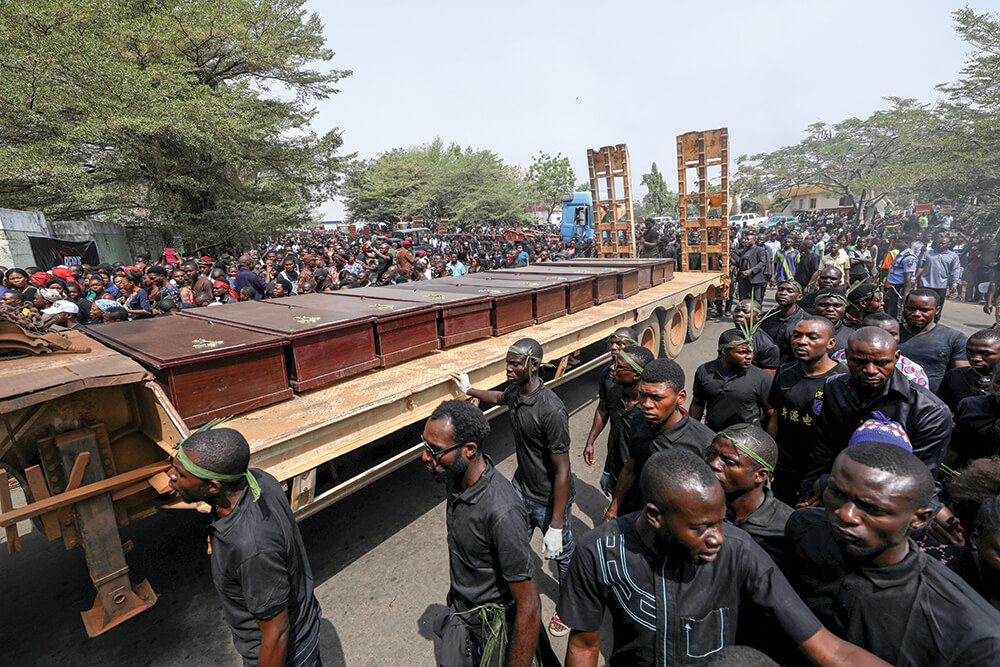U.S Report Says 7,000 Killed In Benue, Nasarawa Herders/Farmers Clashes
A report funded by the United States Agency for International Development, USAID has disclosed that as result of the persistent violence between farmers and pastoralists in the middle belt states of Benue and Nasarawa, an estimated 7,000 Nigerians have died between 2015 and 2019.
The report titled “Engaging Communities for Peace in Nigeria (ECPN),” also noted that the violence has cost the Nigerian economy $13 billion a year over the past five years.
Advertisement
The report was conducted across the states and written by an international non-government organisation, Mercy Corps.
While presenting the report at the Bon Elvis Hotels in Abuja, the group noted that the study was aimed at preventing violent conflict between farmers and herders in the middle belt states.
According to reports, the presentation was witnessed by the paramount ruler of the Tiv, Tor Tiv James Ayatse; the Country Director, Mercy Corps, Darius Radcliffe; USAID Mission Director, Stephen Haykin, represented by USAID country Democracy Officer, Beatrice Reaud and other community leaders from Benue and Nasarawa states.
The report said a programme of interventions in the middle belt states by Mercy Corps had helped to reduce conflict in the area by 13 per cent.
Advertisement
The report said trained participants in the programme succeeded in resolving1932 inter and the intra-community disputes.
According to the report, over 600 disputes over grazing routes, seasonal access to water points, crop damage, cutting down of economic trees, water pollution by animals, and commerce were addressed peacefully in the communities where ECPN worked.
In a closing remarks at the event, Mrs Reaud noted: “Peace and reconciliation lie at the heart of USAID’s global approach to promoting stability and security in conflict-affected areas
“The United States and Nigeria share the objective of reducing violence in the Middle Belt states by peacefully preventing and resolving farmer-pastoralist conflicts.
“We must look beyond the help that Mercy Corps through USAID has given us,” she said.
Advertisement
“We are grateful for the assistance, but [its ideas] must be repackaged an implemented under another name.
“If we don’t change our ways, these problems will continue to hurt us, and it is the poor and downtrodden who suffer most. If you engage in fighting, even if you win, you lose something.”
The Madakin of Lafia in Nasarawa State, Ishaku Dauda, said the USAID Mercy corp initiative had brought peace into their communities.
“We appreciate what they have done. They did not just help face the problem, they helped solve it.
”For instance, if it was a stream that was the cause of the conflict, they dug a borehole as a surplus for water usage for both the herders and farmers.”
“We thank God for Mercy Corp and USAID for what they have done. Some of us never had the idea of coming together, but through their initiative, I began to understand we need to come together to stop the surge,” a member of Zango community in Benue State, Zaki Timbee, said.
Advertisement
In his remarks, the country director of Mercy Corp, Darius Radcliffe, said: “There has been a tremendous amount of learning as a result of the research that has been embedded into the findings.
“We were able to look at the causes and address the causes of the conflicts without scratching the surface. Also in the engagement with the communities we also decided to choose only Nasarawa and Benue states because they were the states that were most affected by the farmer/herders clashes. They were the likely choices four years ago as they were the states with the most critical cases of violence, in terms of farmer/herders clashes.”



